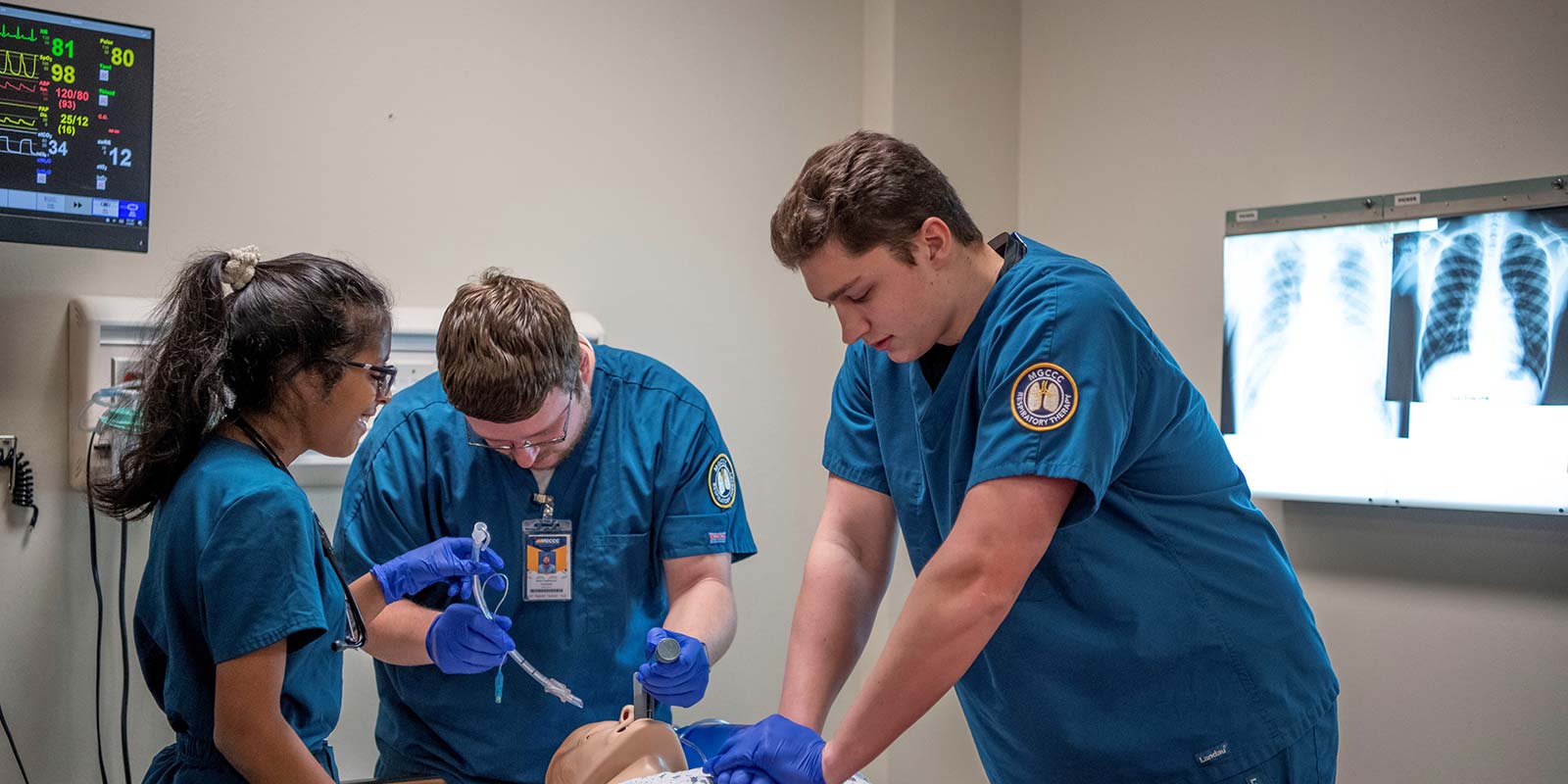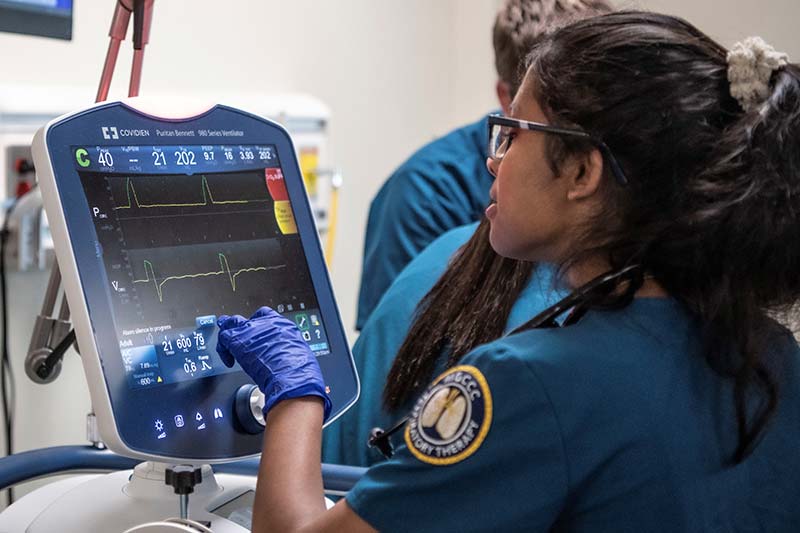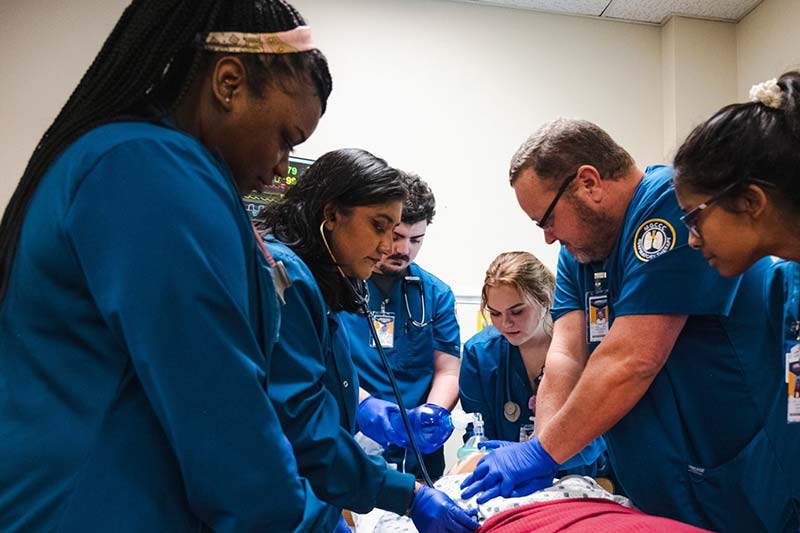
Respiratory Care Technology
Located on the Jackson County Campus, Mississippi Gulf Coast Community College’s Respiratory Care Technology Program (RCT) is a two-year program preparing individuals to become Respiratory Care Practitioners. Our program prepares students to be competent, safe respiratory care practitioners capable of functioning in a variety of health care settings.
A Great Job that Saves Lives — Become a Respiratory Care Practitioner
NO COST Program
This program is being offered with all tuition and fees fully covered thanks to the HEALP Grant. Contact Respiratory Care Technology Program Director, Jennifer Patrick for more information at jennifer.patrick@mgccc.edu or
This project was paid for [in part] with federal funding from the RESTORE Council and the Mississippi Department of Environmental Quality under the Resources and Ecosystems Sustainability, Tourist Opportunities, and Revived Economies of the Gulf Coast States Act of 2012 (RESTORE Act).
Discounted Rate
for Spring 2024
This program is being offered at a special discounted rate. Many of the standard fees, excluding tuition, are being covered by a grant. Contact Respiratory Care Technology Program Director, Jennifer Patrick for more information and details on program costs at jennifer.patrick@mgccc.edu or
Save up to $1,100 (Freshman) or
$1,900 (Sophomore) off program costs
Fees covered
- Registration Fee
- Resource Fee
- Technology Fee
- Career Technical Education Fee
- Substance Testing
- Liability Insurance
- Kettering Fee*
- National Board Exam Fee*
- Bookstore & All Books*
*Sophomores only
Program Requirements & How to Apply
Why Enroll in Respiratory Technology
- Become an expert in areas related to heart and lung disorders and treatment
- Help others manage their disease and improve their quality of life
- Play a significant role in a patient’s ability to improve
- Work with patients of different ages and clinical conditions
- Use state-of-the-art technology to provide direct bedside patient care
- Assist patients and save lives in emergency and critical care situations
- Earn competitive wages and have the flexibility to move anywhere in the country with excellent job opportunities
About the RCT Program
Program Overview
What Students Learn
- How to initiate cardiopulmonary resuscitation
- Set up and monitor life support systems
- How to administer inhalation treatments, oxygen, and drugs
- Perform diagnostic tests that aid in determining the presence and extent of cardiopulmonary disease
- Conduct pulmonary function studies
- Obtain and analyze blood samples
- Perform electrocardiograms, exercise stress tests and sleep studies
Credentialing Examinations
Students who complete the Associate of Applied Science in Respiratory Care will be eligible to take the National Board for Respiratory Care Therapist Multiple Choice (TMC) Exam.
- If students achieve the low-cut score, they will receive the CRT credential.
- The student would then need to retake the TMC to achieve the high-cut score to be eligible to take the CSE.
- Upon passing this TMC at the high-cut score, candidates may take the NBRC Clinical Simulation Exam.
- Upon passing the CSE, students will receive the RRT credential.
The MGCCC RCT Program, (CoARC program #200627), Associates of Applied Science (AAS) Degree, at MGCCC Jackson County Campus holds Continuing Accreditation from the Commission on Accreditation for Respiratory Care (www.coarc.com).
Most state require a license to practice respiratory care that must be applied for after successful program completion.
Commission on Accreditation for Respiratory Care (CoARC)
264 Precision Blvd
Telford, TN 37690
(817) 283-2835
www.coarc.com
CoARC accredits respiratory therapy education programs in the United States. To achieve this end, it utilizes an ‘outcomes based’ process. Programmatic outcomes are performance indicators that reflect the extent to which the educational goals of the program are achieved and by which program effectiveness is documented.
CoARC Programmatic Outcomes Data
This program is designed to meet the educational requirements for respiratory care practitioners in Mississippi. If you intend to seek licensure outside of Mississippi after finishing your program, review the AARC’s Respiratory Care Practice Law by State (PDF) to find information on the state or U.S. territory in which you intend to be licensed.
Mission Statement
The mission of the Mississippi Gulf Coast Community College Respiratory Care Technology program is to provide an outstanding learning environment supported by excellent instruction and support services in order to produce competent, registry-eligible respiratory therapy graduates.
The program will prepare graduates with demonstrated competence in the cognitive (knowledge), psychomotor (skills), and affective (behavior) learning domains of respiratory care practice as performed by registered respiratory therapist (RRT’s).
RCT Program Goals
The goals of the Respiratory Care Technology Program include:
- To prepare graduates with demonstrated competence in the cognitive (knowledge), psychomotor (skills), and affective (behavior) learning domains of respiratory care practice as performed by registered respiratory therapists (RRTs).
Outcomes
- Graduates will be knowledgeable, clinically competent, and skilled in taking care of cardiopulmonary patients, demonstrating the professional capabilities of registered respiratory therapists, as evidenced by passing the NBRC Therapist Multiple Choice (TMC) at a high-cut score.
- Graduates will demonstrate their ability to function as competent and safe respiratory care practitioners in various healthcare settings, as measured by employer surveys.
- The program will graduate a sufficient number of students annually to meet the market demand for respiratory therapists in the Mississippi Gulf Coast area, as evidenced by job placement within six months of graduation.
- Students will exhibit the proper attitude and professionalism necessary to maintain the ethical standard of respiratory care, as assessed by faculty evaluations and preceptor daily student evaluations.
- Graduates will be equipped with the fundamental knowledge, skills and courses necessary for academic advancement and leadership roles in respiratory care, as indicated by their pursuit of further education or leadership positions.
- Achieve a minimum Composite ACT Score of 18
- Have a minimum cumulative (GPA) of 2.5 on college work with no grade less than “C” on any Academic Core* courses in the current RCT curriculum. (Courses may be re-taken and highest score will be used)
- Complete prerequisite courses BIO 2514 – Anatomy and Physiology I Lec/Lab & BIO 2524 – Anatomy and Physiology II Lec/Lab
- Review the online mandatory Pre-School of Nursing and Health Professions Orientation Session prior to completing the supplemental application for program ranking. The session can be viewed anytime and anywhere you have access to the internet. The Power Point presentation gives you valuable information on topics common to all School of Nursing and Health Professions programs at MGCCC. Even without the ability to speak directly or interact immediately with a School of Nursing and Health Professions advisor, the session speaks to frequently asked questions from program entrance to completion. In order to receive credit for viewing the session, follow the steps below. The information is approximately one (1) hour in length.
To complete this requirement, do the following:
- Visit Web Services.
- Select Student.
- Select School of Nursing and Health Professions Supplemental Application Orientation Session.
- In order to receive credit, you must review the entire session.
- Click survey complete so that your log-in information will be recorded in the college’s BANNER system.
Comply with Mississippi law requiring a Criminal Background History Check with Fingerprinting through the Mississippi Department of Health. All students making application to a School of Nursing and Health Professions program at MGCCC are required to obtain a clear or acceptable Criminal Background Check from the MGCCC Campus Police Department at HC, JC, Perkinston, or GC Campus. The criminal background check policy (including testing dates and times) can be viewed at:
School of Nursing and Health Professions Criminal Background Check Policy
RCT Program Cost List
Prior to Entering Program
Criminal Background Check $65 – $80 (MGCCC Campus Police)
Once Admitted into Program
- General MGCCC Tuition and Fees
- Career and Technical Program Fee $40 per credit hour
- Pre-admission Physical Exam and Immunizations $200 – $300
- Books $400-$500 (plus rental fees, if applicable)
- Substance Testing $29 -$35 per semester
- Liability Insurance $12 -$15 per semester
- Additional purchase items, supplies $50 – $100
- Uniform, Accessories $200 – $300
- National Board Exam Application Fee $200 – $400
- Trajecsys (Clinical Competency Program) – $150
- Kettering Comprehensive Respiratory Seminar – $345
- Secure Comprehensive TMC Self-Assessment Examination – $50
Costs are non-refundable and may be subject to change


